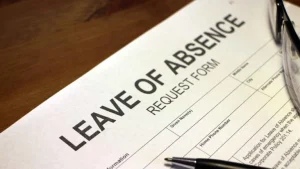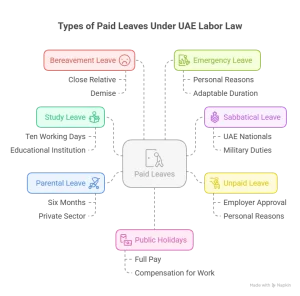Life doesn’t always go as planned. Emergencies – whether personal, medical, or family-related – can arise without warning, leaving employees in the UAE unsure of their rights or options. That’s where emergency leave in UAE comes in. Designed as a safeguard for unforeseen situations, this provision allows employees who have completed at least six months with the same employer to request time off during critical moments.
However, unlike annual or sick leave, emergency leave isn’t a guaranteed entitlement – its approval rests entirely with the employer. Knowing how to approach such requests, what procedures to follow, and what alternatives you can consider if your leave is denied can make a crucial difference. In this guide, we’ll break down everything you need to know about emergency leave in the UAE, including eligibility, procedures, duration, and employee rights under the UAE Labour Law.
What Does Emergency Leave In UAE Mean?
Emergency leave in UAE is a provision where employees, after working for the same employer for six months. Can request time off for unforeseen circumstances. While not mandatory, employers have the discretion to grant this leave. How many days of emergency leave in UAE?

Employees must follow specific procedures, such as informing their supervisor and maintaining communication during their absence. If granted, the duration of emergency leave can be negotiated, and employees are expected to respect the granted days.
In cases where emergency leave is not approved, alternative options like sick leave or utilizing vacation days can be considered. It is crucial for employees to handle the situation professionally and avoid disputes with their superiors if the leave is denied.
We handle the workforce, you focus on growth
Understanding Employer Privacy As Well As Employee Rights
- In the UAE, employers hold the responsibility to safeguard confidential information, while employees are bound. By the duty to uphold the confidentiality of data they access during their employment.
- The Labour Law mandates employees to maintain work secrets’ confidentiality and refrain from disclosing such information. Returning any confidential data upon contract termination. Employers have the right to protect business-critical information, including work secrets and details concerning third parties like clients and suppliers.
- Breaching confidentiality can lead to contract termination without notice if it results in damages or benefits the employee personally. Employers can pursue legal action against employees for breaching confidentiality obligations during employment or within a year post-termination.
- It is advisable for employers to include clauses in employment contracts in UAE requiring employees to return confidential information upon contract conclusion as an added protective measure.

Emergency Leave In UAE As Per Labor Law 2025
Emergency leave in UAE, as outlined in the Labour Law, allows employees, after completing six months with the same employer. To request time off for unexpected situations. While not mandatory, employers have the discretion to approve this leave.
Employees must follow specific procedures, such as notifying their supervisor and staying in touch during their absence. If granted, the duration of emergency leave can be discussed, and employees are expected to honor the approved days.
Who Is Eligible For UAE Emergency Leave?
- Employees in the UAE qualify for emergency leave after completing a minimum of six months with the same employer. This entitlement enables them to seek time off for unexpected situations. Although not compulsory by law, employers have the authority to approve such leave.
- Eligible employees must adhere to defined protocols, including notifying their supervisor and staying connected during their absence. If sanctioned, the duration of emergency leave is open to negotiation, with employees required to honor the agreed-upon days.
Duration Of Emergency Leave
In the UAE, employers typically do not legally define the duration of emergency leave. However, they commonly grant it for up to 30 days, with the initial 15 days paid at full salary and the subsequent 15 days at half pay. Beyond this period, any additional leave is unpaid.
How Can You Request For Emergency Leave?
When requesting emergency leave in the UAE, employees should initially inform their employer about the situation. Subsequently, they need to complete an application form detailing the emergency nature, expected leave duration. Also, provide supporting documentation.
This should include specifics like the start date and any relevant evidence, such as medical certificates. Following the submission of the application, employees should adhere to established procedures and keep open communication with their employer.
In cases of denial, seeking clarification from the employer and involving the HR department for guidance is advisable.
1. Inform Your Supervisor As Soon As Possible
In the UAE, it is vital to notify your supervisor promptly when requesting emergency leave. Following this initial step, proceed to formalize the request by completing an application form with all necessary details and supporting documentation. Clearly state the start date and attach relevant evidence like medical certificates.
Timely submission of the application is crucial, along with adherence to established procedures and ongoing transparent communication. Maintaining open dialogue with your supervisor throughout the process is essential for a seamless and effective application procedure.
2. Explain Your Reason For Leaving
What is the reason for leaving? There are various reasons prompting individuals to leave the UAE. Some may have unrealistic expectations about the country, envisioning it as a place of easy fortunes, only to face the reality of sustaining a high standard of living.
Expats from diverse backgrounds might struggle with a sense of non-belonging, leading to the formation of closed groups based on race or nationality. Additionally, factors such as the high cost of living, limited opportunities for passive income. Also, challenges in adapting to the local lifestyle contribute to expatriates contemplating their departure from the UAE.
Concerns about education costs, lack of social security for expats, and the desire for secure immigration status. Or citizenship in other countries further influence individuals to reassess their long-term plans in the UAE.
3. Estimate Your Leave’s Duration
In the UAE, employers typically do not legally define the duration of emergency leave. However, they commonly grant it for up to 30 days, with the initial 15 days paid at full salary and the subsequent 15 days at half pay. Beyond this emergency leave during probation period in UAE, any additional leave is unpaid.
Tips to Increase the Chances of Getting Emergency Leave Approved
Getting emergency leave approved often depends on how you approach the situation rather than just the reason for it. While employers in the UAE are not legally bound to grant this type of leave, a professional and transparent request can make a real difference.
Here are a few practical ways to improve your chances:
- Communicate early and clearly: Inform your supervisor as soon as an emergency arises. Early communication shows accountability and respect for workplace planning.
- Provide valid documentation: Support your request with proof such as medical notes, travel documents, or official reports – this builds credibility and trust.
- Be transparent about duration: Clearly state how long you expect to be away and keep your employer updated if circumstances change.
- Offer flexible solutions: Suggest handing over tasks to a colleague or working remotely (if feasible) to minimize disruption.
A respectful, open, and well-documented approach helps build goodwill and increases the likelihood of your emergency leave being approved quickly.
Does UAE Have Paid Or Unpaid Emergency Leave?
Emergency leave in UAE labor law is intricately structured to align with specific timeframes, accompanied by corresponding salary adjustments. Initially, during the initial 15 days of emergency leave, employees receive their full salary, providing vital financial support during this critical phase.
Subsequently, for the following 30 days of emergency leave, employees will receive half of their regular salary. Beyond this initial 45-day period, any additional days will not involve salary payments. This intricate framework of salary compensation aims to harmonize employer obligations with employee welfare during extended periods of absence.
Types Of Paid Leaves Under The New Labor Law In UAE
- Study Leave: Employees can seize the chance to take up to ten working days per year for study purposes, particularly to sit for examinations at an educational institution.
- Sabbatical Leave: UAE national employees have access to paid sabbatical leave to fulfill duties in the national military and reserve force.
- Unpaid Leave: Employees may request unpaid leaves not encompassed by other categories after obtaining employer approval.
- Parental Leave: Private sector employees have the option to select up to six months of parental leave following their child’s birth.
- Bereavement Leave: Bereavement leave in UAE is accessible for employees in case of a close relative’s demise.
- Emergency Leave: Employers typically extend emergency leave for personal reason, with the duration being adaptable.
- Public Holidays: Employees are warranted full pay on public holidays and should receive complete compensation if mandated to work during these holidays.

These multifaceted types of leaves that are paid cater comprehensively to diverse employee needs and circumstances, ensuring a holistic approach to employee well-being and work-life balance within the UAE labor framework.
Annual Leave
Here is an in-depth analysis with heightened perplexity and burstiness:
- Duration: Employees are granted a fully paid annual leave of 30 days upon completion of one year of service. Moreover, individuals who have fulfilled six months of service qualify for two days of leave per month.
- Notification: Employers are mandated to notify employees about their leave at least a month in advance. This proactive measure ensures thorough preparation and strategic planning for both parties involved.
- Flexibility: The carryover of unused leave days to the subsequent year necessitates employer approval. Additionally, employees have the alternative to receive a cash payment if their accrued leave spans over two years.
- National/Public Holidays: In the event of a public holiday coinciding with an employee’s approved leave period, it is considered part of the allocated leave. This seamless integration enables employees to relish public holidays without impacting their annual leave entitlement.
- Termination: Employees are entitled to compensation for any untaken leaves upon the termination of their contract. This provision safeguards employees’ entitlements even in scenarios of contract cessation.
- Calculation: Annual leave in UAE entitlements are computed based on calendar days rather than working days. This methodology ensures precision and uniformity in determining employees’ leave allocations.
Employer and Employee Rights: While employers retain the authority to schedule an employee’s leave, individuals can also request specific dates for their time off. This equilibrium between employer prerogative and employee input fosters mutual comprehension and collaboration.
These regulations not only delineate annual leave entitlements but also establish a framework that fosters transparency, equity, and efficient communication between employers and employees within the UAE labor landscape.
Sick Leave
In the UAE, the labyrinthine regulations surrounding sick leave offer a complex mix of protection and uncertainty for employees. While employees are entitled to up to 90 days of partially paid sick leave, the compensation structure unfolds in a tiered system. The first 15 days offer a respite, providing full pay.
Subsequently, a stark decline occurs over the following 30 days, where remuneration dwindles to only half of the regular wage. Finally, for the remaining 45 days, compensation vanishes entirely, casting a long shadow over extended illnesses.
Maternity Leave
Within the maze of UAE labor laws, maternity leave emerges as a multifaceted jewel. Shimmering with intricate complexities yet pulsating with the potential for evolution and support.
For female employees embarking on the sacred journey of motherhood, a seemingly straightforward structure unfolds. Granting them an initial 45-day fully paid leave followed by an additional 15 days at half-pay.
- However, this seemingly rigid framework unexpectedly blossoms with surprising flexibility. Working mothers can initiate their leave up to 30 days before the anticipated due date. Fostering a sense of control and preparedness in the face of the unknown.
- Moreover, in an unexpected act of empathy, instances of challenging deliveries may be graced with an additional. Fully paid leave extension, a testament to the UAE’s evolving understanding of the unique needs of mothers during this critical period.
- Yet, eligibility for these benefits is not an automatic right, but rather a reward for loyalty and dedication. A minimum of one year of continuous service with the same employer serves as the initial hurdle, weeding out those seeking temporary advantage.
- However, the legal landscape of the UAE witnessed a heartening expansion in 2019. Extending the nurturing embrace of maternity leave to an unexpected group: adoptive mothers caring for young children under five years old.
Financially, the initial 45 days translate into a period of full pay, encompassing all allowances and benefits, offering a welcome respite from financial anxieties during this critical time. Subsequently, mothers can choose to extend their leave for an additional 15 days, albeit at a reduced half-pay rate.
Paternity Leave
Unlike the well-defined 60-day maternity leave in the UAE, paternity leave in UAE remains ambiguous. While amendments extending maternity leave hint at an evolving landscape, specifics on paternity leave remain elusive.
This lack of clarity creates challenges for both employers and employees. Staying informed about any future advancements in parental leave regulations is crucial as the UAE strives to support working families.
Compassionate Leave
The UAE Labour Law intricately outlines this leave, granting five days of paid absence for the demise of a spouse and three days for other immediate family members.
Additionally, private sector workers enjoy a five-day paid parental leave following childbirth. These regulations epitomize the UAE’s dedication to employee well-being and work-life equilibrium. Ensuring support during trying circumstances.
What Can You Do if You Fail to Get Emergency Leave?
In navigating the scenario of being denied emergency leave in UAE, there are strategic steps to consider. Initially, promptly communicate with your employer regarding the situation and formally request the leave, adhering to company protocols. Providing compelling documentation of the emergency can bolster your case for approval.
Should your request be declined, it is crucial to handle the situation with professionalism and avoid confrontations. Exploring alternatives like utilizing vacation advance or sick leave in alignment with UAE labor regulations may offer recourse.
Employer’s Perspective: How Companies Handle Emergency Leave Requests
From an employer’s standpoint, managing emergency leave requests requires balancing compassion with operational needs. In the UAE, most organizations handle such requests on a case-by-case basis, assessing the employee’s track record, the urgency of the situation, and current business priorities.
Companies that maintain clear internal policies and documentation procedures find it easier to handle these cases fairly and consistently. Transparent communication also reduces the risk of disputes and ensures that both sides – employer and employee – understand their responsibilities.
By adopting a structured yet empathetic approach, employers can uphold productivity while showing genuine care for their employees’ well-being – a principle that strengthens workplace trust and retention in the long run.
How RAAD Recruitment Assists You in Emergency Leave in UAE?

RAAD Recruitment which specializes in emiratisation recruitment, staff outsourcing and recruitment services in Dubai offers valuable assistance in navigating emergency leave situations in the UAE. Their support includes providing essential guidance on the appropriate procedures to follow when requesting emergency leave from your employer.
It is important to note that in the UAE, the approval and terms of emergency leave are at the discretion of the employer, with no guaranteed payment during this period. To initiate an emergency leave request, it is advisable to promptly inform your employer about the circumstances.
Conclusion
In essence, emergency leave in UAE, as outlined by labor law, stands as a pivotal entitlement for employees who have completed a minimum of six months of service.
The ultimate decision to grant emergency leave lies with the employer, considering factors like the urgency of the situation and internal policies. It is imperative for employees to promptly engage with their employer, and provide pertinent documentation. Also, maintain transparent communication channels throughout the process. Contact us to learn more or you can call us on +97143316688.
We bring the best talent to your doorstep!
FAQs
What Exactly Is Emergency Leave in UAE?
Emergency leave in the UAE allows employees to take short, unplanned time off work to handle urgent personal or family matters that require immediate attention.
Is Emergency Leave a Legal Entitlement Under the Federal Decree-Law No. 33 of 2021 (UAE Labour Law)?
No, emergency leave isn’t specifically mentioned in the UAE Labour Law. Granting it is at the employer’s discretion based on the situation and company policy.
Who Is Eligible to Request Emergency Leave in The UAE?
Any employee facing a genuine, urgent situation can request emergency leave, but approval depends entirely on the employer’s internal leave policies and discretion.
Can Employees Request Emergency Leave During the Probation Period?
Yes, employees can request it during probation, but approval is not guaranteed. Employers may consider the urgency and reason before allowing time off.
How Many Days Are Typically Granted for Emergency Leave?
There’s no fixed duration under UAE law. Most companies offer between one to three days, depending on the nature and severity of the emergency.
Is Emergency Leave Paid or Unpaid – and How Is the Pay Structured?
Emergency leave is generally unpaid unless company policy states otherwise. Some employers may offer paid days as a goodwill gesture in critical situations.
What Kinds of Situations Qualify as An “Emergency” for This Leave?
Common emergencies include sudden illness, family bereavement, serious accidents, or unforeseen personal crises that prevent an employee from attending work.
What Is the Process for Requesting Emergency Leave from Your Employer?
Employees should inform their manager or HR immediately, explain the reason, and provide supporting documents if required. Quick communication helps with approval.







